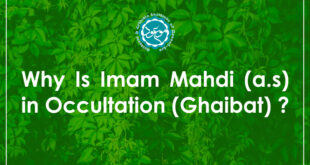Relationship with Children
The Fundamental Role of a Mother in the Well-Being and
Prosperity of a Generation:
There is no doubt that to a very large extent, the future of a child depends greatly on the mental and psychological influence that he is exposed to, through people closest to him in his childhood. And naturally since a mother is the closest to a child during his growing years, her role in his upbringing is of the utmost importance.
Therefore, we could say that the starting point of the success or failure of an individual’s life is the mother’s lap and the overall environment of his upbringing, of which the mother constitutes the main pillar. The child is therefore like a soft lump of wax which is moulded in the hands of his mother.
If we carefully examine the emotional and logical approach of Hazrat Fatima (SA) in the upbringing of her great children, we will be able to discover very subtle and delicate methods used by her in their upbringing. Behavioral psychologists and other experts who have studied these methods closely, have developed faith in the positive effects of the approach adopted by this great lady. This unique success in the upbringing of children has its roots in the profound understanding of the nature of man as has been explained by Islam. Every school of thought has recommended methods of upbringing of children, based on its interpretation and understanding of innate human nature. An unbiased research and analysis easily proves that the definition and explanation that the divine religion of Islam has revealed, regarding the complete innate nature of man (taking in consideration, all his physical, emotional, psychological, material as well as spiritual needs), is the most perfect and objective. Moreover, since the method of child-training and parenting used by Hazrat Fatima (SA) was based in this Divine Source, studying and practically adopting this method could ensure the success and well-being of our children both in this world and in the Hereafter.
One of the most critical factors determining the characters of the children of Hazrat Fatima (SA) was genetics. As we all believe, she was an Infallible (Ma’sum) and was thus free from all kinds of sins and moral pollution. The Ziyarat of Imam Hussain (AS) confirms:
“I testify that you (i.e. Imam Hussain) were from a pure seed that was nurtured in a pure womb, free from polytheism and ignorance.” (“Ziyarat of Imam Hussain”, see Mafatih ul-Jinan).
Imam Hussain had himself emphasized on the purity of Hazrat Fatima (SA), on the Day of Ashura, when he announced:
“The virtues of courage, freedom and generosity, I owe to the purity of my mother Hazrat Fatima (SA).”
All of us are aware of the importance and the greatness of the Day of Ashura (10th of Muharram), and as a matter of fact, the extraordinary roles that the children of Hazrat Fatima Zahra (SA) played, throughout the historical event were the result of her powerful upbringing and training. In other words, the Karbala phenomenon is one of the best testimonies of the divine nature of her methods of child-rearing.
The Methods of Child-Upbringing Adopted by Hazrat Fatima (SA)
Psychologists and child-training experts have always debated regarding the best age to commence child-training, and have not really reached to any substantial conclusion regarding the issue, even today. However, according to Islam, the point that actually starts affecting the soul of the child is the moment a name is chosen for him. And this is the first stage in the moulding of the character of a child. It is because of this very important reason that Islam has laid great emphasis on care and attention in naming of children. Thus, a good name has a very deep and lasting effect on the soul of a child. In this context, Imam Ali (AS) has advised thus in one of his sayings mentioned in the “Nahjul-Balagha (“Peaks of Eloquence”):
“… while the right of the child on the father is that he should give him a good name.” (Saying No. 409)
In other words, one of the primary duties of parents, especially the father, is the selection of a worthy name for his child. It is for this very important and scientific reason that Fatima (SA), after consulting her husband, Imam Ali (AS) and her beloved father, Prophet Muhammad (SAW), chose the best and most beautiful names for her children.
Sacrifice of a goat or sheep (Aqiqah)
Aqiqah (sacrifice of a goat or sheep) and also alms-giving, are highly-recommended acts that have been greatly emphasized in Islamic traditions. It has been recorded that whenever Fatima (SA) would be blessed with a child, she would sacrifice a sheep and would distribute the meat among people. Then on the 7th day of the child’s birth, she would shave his/her head and distribute in charity (alms), the equivalent in silver, of the weight of the shaved-hair of the child. Also she would send gifts to the mid-wife as well as the neighbors such that they too, would share the happy event with her family. (“Bihar ul-Anwar, vol. 43, p. 257)
Another custom followed by Fatima (SA) was that as soon as her child would be born, she would recite the `Adhan’ in his/her right ear and would recite the `Iqamah’ in his/her left ear. This was because she was very well-aware that if the child would be acquainted with the names of Allah, Muhammad (SAW), salat, etc., from the very beginning of his early life, it would have deep and lasting effects on his/her psychological inclinations.
The Role of Maternal Emotions in Child’s Upbringing:
The soul of a human being is created in such a way that love and compassion are among one of its most basic needs. This is the reason why children who have been deprived of love, care and attention, become prone to various psychological and physical illness, a fact that has been proved scientifically. Research indicates that many crimes committed are rooted in the vacuum created by lack of love and affection in the life of an individual.
Fatima (SA) who had herself grown up saturated with the love and affection of her beloved father (SAW), showered the same love and warmth upon her children.
An incident that has been narrated by one of the close companions of the Prophet named Salman, says:
“One day, I saw Fatima (SA) who was busy grinding some grain. In the meanwhile, her son Hussain (AS) became impatient and started crying. I offered my help to Fatima (SA), asking her whether she would prefer me to take over the grinding of grain or whether it would help her if I comforted the child. She answered by saying that it would be better for me to take over the grinding, since she would be better at comforting her child” (Bihar ul-Anwar, vol. 43, p. 280).
This incident gives us the knowledge of the importance of a mother’s soothing presence for a child. It indicates how no one else can soothe and comfort a child, better than his own mother, an important message to mothers in today’s “creche and milk-bottle” culture. She showed us just how important it is for a child to have his mother around when he needs her and how these little moments of attention go a long way in shaping a confident, secure and powerful personality for a human being.
Paying Attention to the Needs of Children
One of the most important factors for the mental and physical well-being of a child is nutrition and the other is hygiene. Thus providing for these needs of the child, guarantees his physical and psychological well-being for life. Many of the psychological and mental problems that surface in adulthood too, have their roots in unfulfilled childhood need and desires. Moreover, the mutual effects between the body and the spirit should never be taken for granted or neglected. There is no doubt that a sick body distresses the soul, while an unrestful soul causes physical disorders.
History has recorded that time and again, Hazrat Fatima (SA) would go hungry in order to feed her children. It is said that once, because of scarcity of water, the Muslims of Medina were facing severe problems. Like any other mother, Fatima (SA) was concerned about her sons Hassan and Hussain (AS) and took them to her father, the Prophet (SAW). She expressed her concern to her father saying that she was worried since her children were small and couldn’t bear the thirst. Seeing Fatima distressed, the Prophet (SAW) put his tongue into the mouths of his two grandsons. This immediately soothed Fatima (SA) and relieved her of her concern as well as satiated the extreme thirst of the two children. (Manaqibe Ibn-e Shahr Asheeb, vol. 3, p. 394)
Fatima (SA) loved her children so deeply and was so full of compassion that towards the end of her life, she was very worried about her small children. Her main worry was that these children would be deprived of a mother’s love which no one else could probably be able to compensate for. Foreseeing the plight of her motherless children, Fatima (SA) suggested that her husband Imam Ali (AS) married someone who would take care of her children, after her demise. (Ibid., p. 362)
 Mouood Mouood English Edition
Mouood Mouood English Edition




